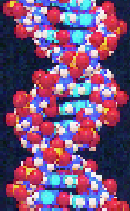THIS WEEK IN ENVIRONMENTAL HEALTH

WEEK # 15 (December 7 - 11, 1998)
Monday, December 7, 1998: Genetic Toxicology --- Dr. Paul Kirby
Sitek Research Laboratories, Gaithersburg, Maryland
Sitek Laboratories is a research testing group composed of PhDs, MDs, cytogeneticists and technicians who test a variety of substances for toxicity to human cells and other safety factors.
In the United States, all pharmaceuticals, chemical additives to food and other products, personal care products and medical devices are subject to rules and regulations devised by the Food and Drug Administration (FDA) and the Environmental Protection Agency (EPA) to protect the health and safety of the citizens of the country. All substances of this nature, except tobacco (under the auspices of the Department of the Treasury) are under these two regulatory agencies. Sitek Laboratories ascertains the validity of these safety checks on substances submitted to them. The studies by this laboratory are so thorough that they have never had a report on a submitted examination ever rejected by one of the regulating agencies.
The substances tested include the following:
- Pharmaceuticals (photoactive chemicals used in chemotherapies)
- Agricultural chemicals (herbicides, pesticides, growth factors for animals)
- Medical devices (ocular and surgical lasers)
- Industrial chemicals
- Food additives
- Tobacco additives
- Natural plant extracts (bio-engineered and natural products. Ex: insulin; "native" medicines)
- Organic extracts (side products of the petroleum industry)
All tests that the lab performs are pre-clinical tests, i.e., all tests are before any humans are used in the study. There are two phases to the studies: toxicological and genetic toxicology.
Why do safety testing?
1. Protect the population
- Avoid birth defects caused by chemicals (ex: thalidomide)
- Avoid exposure to cancer-causing chemicals (100s out there: product does job; tastes good, but causes cancer, therefore cannot be used)
- Prevent mutations that may be passed along to future generations
- Avoid serious side effects of chemicals or substances (ex: causes liver damage)
2. Protect the environment
- Harmful to wildlife (ex: DDT effects on bald eagle eggs)
- Accumulation of pesticides in the environment (degradation and breakdown into non-harmful substances is necessary)
- Accumulation of toxic chemicals in wildlife (ex: mercury accumulation in swordfish)
- Pathologic changes in wildlife (ex: cancerous lesions on fish in Boston Harbor due to pollutants in the water)
3. Requirements of Regulatory Agencies
- FDA
- EPA
- JMAFF (Japan)
- JMHW (Japan)
- CMHW (Canada)
- OECD -- Organization for Economic Cooperation and Development (International --- Especially important for industrial chemicals shipped worldwide)
- ICH -- International Committee for Harmonization (International --- Especially important in pharmaceutical products worldwide)
Genetic Testing
Genetic testing includes examination of products for any of the following problems associated with a product:
- Gene mutation (heritable change that occurs to a gene)
- Chromosome aberration (heritable change that occurs to a chromosome)
- DNA damage
- Aneuploidy (an increase or decrease in the normal number of chromosomes. Down’s syndrome is an aneuploid condition)
- Germ cell abnormality (ex: malformed sperm; can cause sterility)
Gene Mutation Assays
These tests are performed using several different methods:
1. Bacterial cells
- Salmonella typhimurium/E. coli Mutation Assay (Ames Test - developed in 1967)
- Screening assay
- Plate inoculation
2. Mammalian cells -- look for effects to or within cells
- L5178Y TK +/- (Mouse Lymphoma Mutation Assay)
- CHO HGPRT (Locus Mutation Assay)
- CHO AS52/XPRT (Locus Mutation Assay)
3. Micronulcleus Assays --- look at piece of chromosome
4. Chromosome Aberration Assays
- In vitro --- test in tissue culture cells: Chinese Hamster ovary
- In vivo --- test in animals
 Click here to go to the Archives Page!
Click here to go to the Archives Page!
 Click here to fly back to the home page!
Click here to fly back to the home page!


 Click here to go to the Archives Page!
Click here to go to the Archives Page!  Click here to fly back to the home page!
Click here to fly back to the home page!